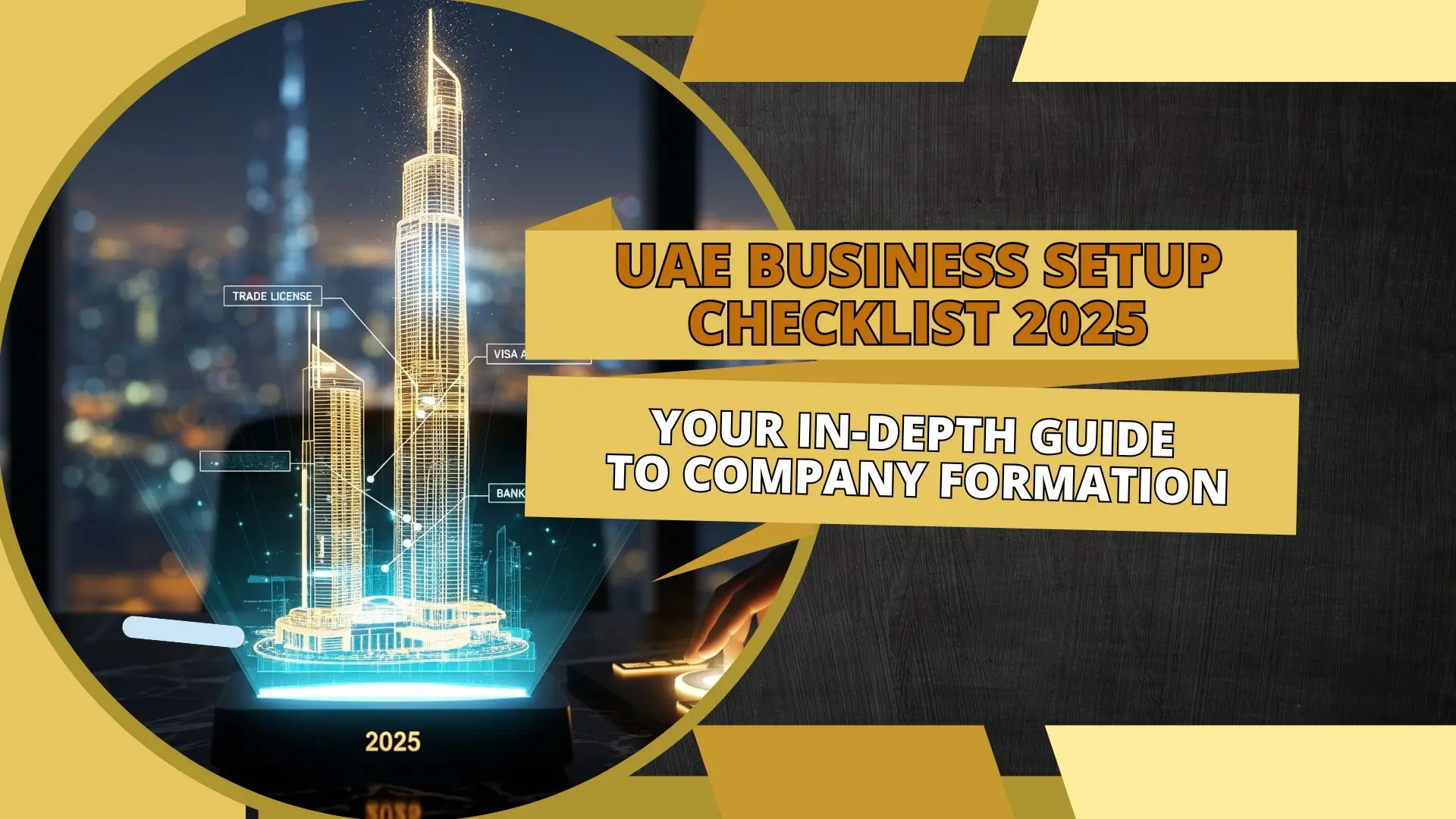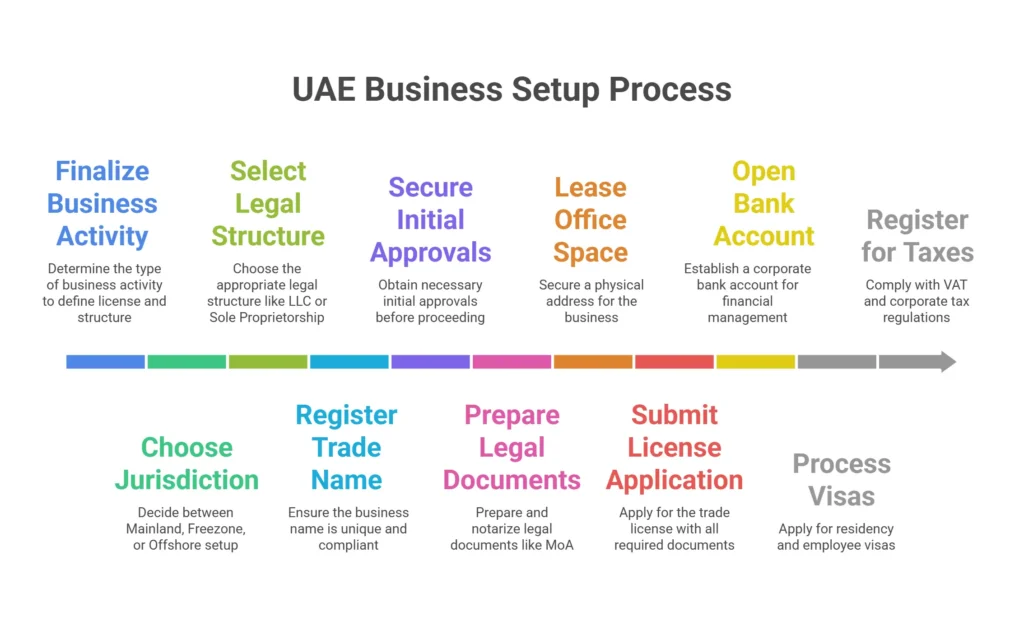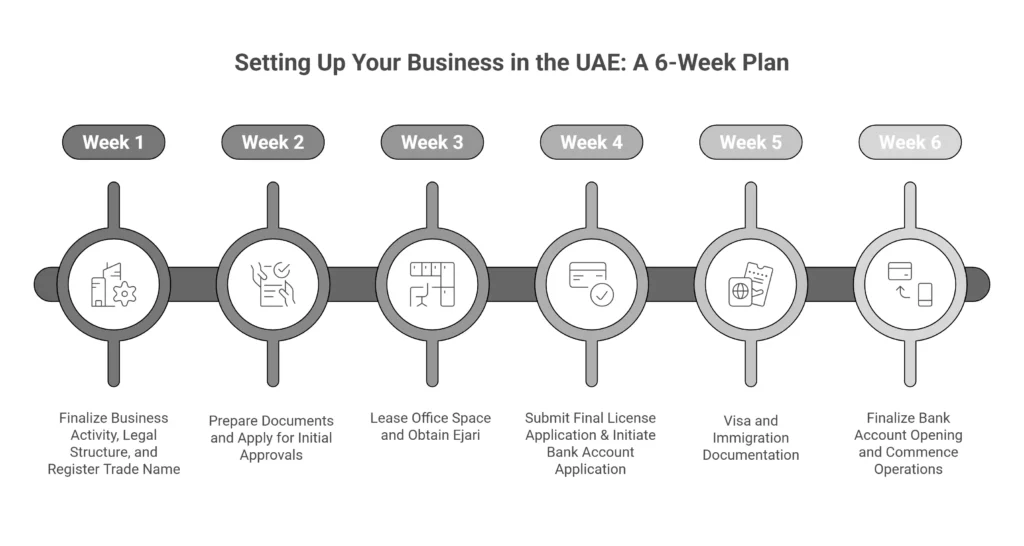
Starting a business in the United Arab Emirates is a promising venture, provided you navigate the process with a clear and accurate plan. This UAE business setup checklist 2025 is engineered to guide you from your initial idea to a successful launch, eliminating stress and ambiguity. Whether your passion lies in real estate, digital marketing, or technical services, this guide provides actionable insights. Crucially, it fills the gaps most guides miss: precise fees, document translation timelines, and the correct submission sequence. Let’s build your foundation with up-to-date, easy-to-follow steps.
Why the UAE Remains a Premier Global Business Hub in 2025
The UAE continues to be a magnet for global investors, thanks to its significant tax advantages, strategic geographic location, and world-class infrastructure. Recent reforms, including 100% foreign ownership across a vast number of sectors and simplified visa regulations like the Golden Visa, have further solidified its appeal to international entrepreneurs.
The economic landscape is also evolving. The UAE government is actively promoting non-oil sectors, leading to a surge in industries like renewable energy, logistics, FinTech, and digital marketing. This economic diversification, coupled with a business-friendly environment, makes the UAE a fertile ground for startups and established enterprises alike.
The Ultimate UAE business Setup Checklist 2025
This checklist, refined through real-world client experiences and the latest updates from the Department of Economic Development (DED) and various Freezone authorities, provides a clear roadmap.

The Core Steps -UAE Startup Checklist :
- Finalize Your Business Activity: Your chosen activity dictates the type of license and legal structure.
- Choose Your Jurisdiction: Decide between Mainland, a Freezone, or an Offshore setup.
- Select a Legal Structure: Options include LLC, Sole Proprietorship, or a branch of a foreign company, among others.
- Register Your Trade Name: Ensure your proposed name is unique and compliant with UAE naming conventions.
- Secure Initial Approvals: This is a crucial step before you can proceed with other formalities.
- Prepare and Notarize Legal Documents: This includes your Memorandum of Association (MoA).
- Lease Office Space or Secure an Ejari: A physical address is mandatory for most setups.
- Submit Final License Application: Once all documents are in order, you can apply for your trade license.
- Open a Corporate Bank Account: This is essential for managing your business finances.
- Process Visas: Apply for residency and employee visas as required.
- Register for VAT and Corporate Tax: Understand and comply with the UAE’s tax regulations.
Business Setup UAE Routes: Mainland, Freezone, Offshore – A Detailed Comparison
Choosing the right jurisdiction is fundamental to your business’s success.
- Mainland: Ideal for businesses that intend to trade directly within the local UAE market. A key advantage is the ability to bid for government contracts. Mainland companies are registered with the Department of Economic Development (DED) and generally require a physical office space registered with Ejari. While historically requiring a local sponsor, recent reforms now allow for 100% foreign ownership in many sectors.
- Freezone: Perfect for businesses focused on international trade, tech startups, and digital marketing agencies. Freezones offer 100% foreign ownership, full repatriation of profits, and exemption from corporate and personal income taxes. Each of the numerous free zones often caters to specific industries.
- Offshore: Best suited for international business operations, holding companies, and asset protection. Offshore companies are not permitted to trade within the UAE but offer a cost-effective and straightforward setup with minimal physical presence required.
Timeline Tracker: A Realistic Week-by-Week Setup Plan (0–6 Weeks)
| Week | Task | Key Details & Considerations |
| Week 1 | Finalize Business Activity, Legal Structure, and Register Trade Name | The Department of Economic Development (DED) can approve a trade name within a few business days. |
| Week 2 | Prepare Documents and Apply for Initial Approvals | This includes drafting the Memorandum of Association (MoA) and gathering all shareholder documents. |
| Week 3 | Lease Office Space and Obtain Ejari | A registered tenancy contract (Ejari) is mandatory for mainland licenses. Freezones offer flexible desk options. |
| Week 4 | Submit Final License Application & Initiate Bank Account Application | Freezone license issuance can be as fast as 3-5 working days, while DED approvals average 5-7 business days. |
| Week 5 | Visa and Immigration Documentation | This includes medical tests and Emirates ID application for all partners and employees. |
| Week 6 | Finalize Bank Account Opening and Commence Operations | Banks have strict KYC (Know Your Customer) procedures, so be prepared with all required documentation. |

The Definitive UAE Company Formation Checklist: Documents & Logistics
A meticulous approach to documentation can prevent significant delays.
Essential Documents:
- Passport copies for all owners and partners
- Emirates ID copy (if applicable)
- Trade name reservation certificate
- Initial approval certificate from the relevant authority
- Signed and notarized Memorandum of Association (MoA) or Local Service Agent (LSA) agreement
- Ejari or office tenancy contract
- No Objection Certificate (NOC) if required for specific activities
Crucial Translation and Attestation Insights:
- All legal documents, such as the MoA, must be translated into Arabic by a certified translator.
- These documents then require notarization and attestation by the relevant courts and ministries.
- Critical Sequence: Ensure your trade name is approved before proceeding with the translation and notarization of your legal documents to avoid costly revisions.
Budgeting Guide: UAE Setup Cost Comparison by Zone
Here is a more detailed look at potential costs, though these can vary based on specific business activities and requirements.
| Setup Zone | Average Setup Cost (AED) | Key Cost Components |
| Mainland | 20,000 – 40,000+ | Includes trade license fees (AED 10,000-15,000), office rent (mandatory), and government fees. |
| Freezone | 12,000 – 30,000+ | Packages often include the license, and some visa allocations. Costs vary significantly between free zones. Some affordable options start as low as AED 5,750. |
| Offshore | 7,000 – 15,000 | Primarily covers registration and agent fees, making it the most affordable option. |
| Visas & Admin | 5,000 – 10,000 | Covers visa processing, medical tests, Emirates ID, and fees for a Public Relations Officer (PRO). |
From Setup to Operation: Banking, Tax, and Compliance Essentials
Opening a Corporate Bank Account: This process has become more stringent. Banks require a comprehensive set of documents to fulfill their KYC (Know Your Customer) and AML (Anti-Money Laundering) obligations.
Required Documents Typically Include:
- Valid Trade License
- Passport copies and Emirates IDs of all shareholders and signatories
- Memorandum of Association (MoA)
- Office lease contract (Ejari for mainland)
- A detailed business plan and sometimes proof of business activity through existing contracts or invoices.
VAT and Corporate Tax Registration:
- VAT: Mandatory registration is required if your annual turnover exceeds AED 375,000. Businesses must maintain records for at least five years and file returns quarterly.
- Corporate Tax: A federal corporate tax of 9% is applicable on profits exceeding AED 375,000. It is crucial to register for corporate tax to remain compliant, as filing is mandatory even if no tax is owed.
Real Estate, Admin, and Ejari Explained
Your choice of office space is intrinsically linked to your trade license.
- Mainland: A physical office with a valid Ejari-registered lease is a legal requirement. The Ejari system, managed by the Real Estate Regulatory Agency (RERA), legitimizes your tenancy contract.
- Freezones: Offer greater flexibility, with options ranging from shared “flexi-desks” to dedicated smart offices, which can be a more cost-effective solution for startups.
- Certain business activities, particularly in sectors like real estate and solar energy, may require a physical office space that is subject to inspection by authorities.
Your Final UAE Startup Checklist for 2025
Before you launch, run through this final checklist to ensure all bases are covered.
✅ Trade license is issued and valid.
✅ Corporate bank account is fully operational.
✅ All partner and employee visas are processed and in hand.
✅ Registered for VAT and Corporate Tax (if applicable).
✅ Aware of all ongoing compliance and renewal deadlines.
✅ Office space is fully set up and operational.
Red Flags & Common Mistakes to Avoid

- Mismatching Business Activity and License: Choosing the wrong activity on your license can lead to fines and operational hurdles.
- Ignoring Document Translation and Attestation: This is a non-negotiable step that can cause significant delays if not done correctly and in the right sequence.
- Underestimating Costs: Your budget should always account for administrative fees, PRO services, and potential unforeseen expenses.
- Neglecting Tax and Compliance Timelines: Missing deadlines for VAT returns or corporate tax registration can result in hefty penalties.
FAQ -UAE business setup checklist 2025
What is the fastest way to set up a business in the UAE?
Freezone setups are generally the quickest, with some licenses being issued in as little as 1-3 working days.
Can I start a business in the UAE without a local sponsor?
Yes, following recent reforms, 100% foreign ownership is now permitted in the majority of business sectors on the mainland.
What is the cheapest business setup option in the UAE?
Offshore company formation is the most cost-effective, but it comes with limitations on trading within the UAE. For onshore options, certain free zones like SHAMS and RAKEZ offer very competitive packages.
Do I absolutely need a physical office?
A physical office with an Ejari is mandatory for mainland businesses. Freezones provide more flexible options, including virtual offices.
What are the trending industries in the UAE for 2025?
The UAE’s economy is seeing significant growth in sectors like technology (AI, FinTech), logistics and transportation, e-commerce, renewable energy, and real estate.







No comment yet, add your voice below!